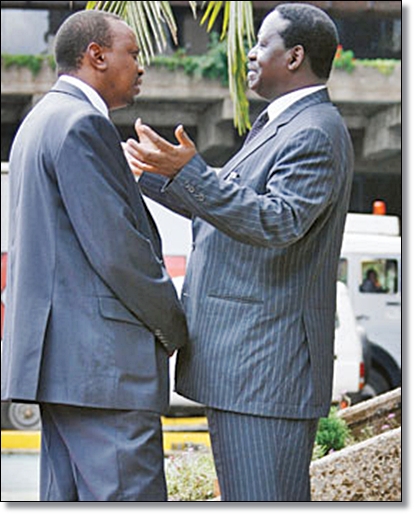Raila, Uhuru Can Detribalize Kenya
 |
| Hon. Uhuru Kenyatta and Raila Odinga P.Courtesy |
Kenya’s history is defined by tribalism that transcends economic and political realms. Tribalism is killing us from within and nepotism does not make it any better. Although the vice can be traced to pre-independence, the founding fathers of this nation only scaled it further.
Kenya, in my opinion initiated herself into tribalism when she first demarcated the country into provinces and regions that comprised of mainly one ethnic community. Tribalism in Kenya is not a historical inevitability. It cannot be traced to ancient hatred or culture wars. In fact, the major opposing groups, the westerners (Luo, Luhya, Kalenjin, Kisii) of western Kenya and the GEMA (Kikuyu, Embu and Meru people) from Mount Kenya area, had little contact with one another before the coming of the colonialists. Accordingly, Kenya’s tribalism is a relatively new phenomenon. It is a product of modern times arising from colonialism, urbanization and the political culture that sprung up in independent Kenya.
The panacea to tribalism in Kenya lies in the political leadership. This draws me to Prime Minister Raila Odinga and his Deputy, Uhuru Kenyatta. It is not in doubt that the duo commands a remarkable following in this country, whether drawn from ethnic affiliations or otherwise. Coincidentally, their fathers are respected founder fathers of this nation. Odinga is known to have nurtured Bildad Kaggia and Kenyatta did the same with Tom Mboya.
Raila and Uhuru have the capacity to detribalize this country publicly. Uhuru’s recent tour of Nyanza and his remarks need accolades from all and sundry. He had to do it if he is to convince the skeptics amongst us that he is not running for President as an ethnic chieftain.
Odinga, his primary rival for presidency, was deliberately going out of his way to engage Central Kenya on the stereotypes and myths that the region held of him. Uhuru had to go to Kisumu to move his nationalist credentials a notch higher by replicating the PM’s engagements with Kikuyus; amongst Luos in Nyanza.
It is not a secret that the Odinga-Kikuyu; Uhuru-Luo relationships are the most glaring of Kenya’s ethnic political divisions and if both leaders are seen to be deliberately reaching across to the other community, Kenya would fare better as far as ethnic relations in politics are concerned as we head to the next General Election.
However, Uhuru did not set aside time to explain his political agenda to members of this region; or to explain how Luo-Nyanza would look like under a Uhuru Presidency next year; or explain several statements he has made around his woes with the ICC which directly suggest that the Prime Minister is to blame for his case at the ICC; or explain why he rarely campaigns in Luo Nyanza.
Uhuru while in Ndhiwa, publicly committed to support Raila should he win next election. This is the proverbial paradigm shift in Uhuru/Raila political competition dynamics, especially considering that Uhuru has in the past been known to bang tables in frustration with Raila Odinga.
Nevertheless Uhuru’s public statement could go along in detribalizing Kenya. It puts to shame those unscrupulous politicians and their political operatives who have been trying to sell the message that a Raila-Odinga Presidency will bring nothing but doom, blood-shed and destruction in Kenya.
If Raila and Uhuru publicly play ball as such, this country will be walking a path devoid of political landmines that have in the past often culminated into ethic clashes every election year. Uhuru ought to be commended for showing the way out of negative ethnic politics. Equally, the PM responded in kind. At a rally in Kangema, he confirmed that should Uhuru win the presidency in 2013, he would work with him.
If the duo can maintain the ball game, they will be acknowledging that tribalism is not that dinosaur that cannot be exterminated. They are the front-runner and first runner’s-up in the Kibaki succession jigsaw. It is also a call-out to all the other Presidential aspirants to do something similar.
The two leaders have no option but to detribalize Kenya. With the new constitution, the vice has been dealt with. What we are left with are wounds and scars of tribalism in our country. Kenya can further deal with tribalism by educating all tribes on the importance of shunning ethnicity, treating all people from various tribes equally, equally sharing the national cake and providing equal opportunities to everyone.
Besides, hitherto marginalised communities can be empowered so that they too can realize their full potential in nation building. Besides, the need to shun tribalism can be incorporated into the education curriculum to teach young ones that we are all equal Kenyans and we deserve and ought to treat each other fairly, rightly, justly and brotherly.
Kenyans are generally peace loving people. Kenyans from various tribes have settled all over the land - from Kambas at the Coast to Luhyas and Luos working in the coffee plantations and factories in Thika - to the Kisii in Kitengela.
By Kasembeli Albert
Managing Editor, Security East Africa, a regional magazine focusing on security in the region.
